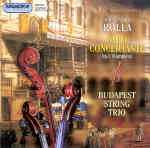Alessandro Rolla (1757-1841) might best be remembered, to the extent he is remembered at all, as Paganini’s friend and teacher. His career centered around Milan, where he was famous not only as a pedagogue but as a performer (on viola) and conductor. His six string trios, published around 1800, reveal a cultivated musical mind and a thorough assimilation of the classical style as practiced by Haydn. Each has three movements: a long sonata-allegro that’s sometimes as long as both succeeding movements combined; an adagio or (in three works) a theme-and-variations andante; and a rondo finale featuring a very catchy principal tune. Although the first violin dominates, each player has plenty to do, and the textures are invariably contrapuntally rich and full. This isn’t stereotypical low-brow “theme and accompaniment” Italian instrumental music or cheap Rococo fluff. Two of the works last around 25 minutes, demonstrating that Rolla was working on a comparatively large scale despite the small forces.
In short, these are well crafted pieces that would grace any collection that includes a healthy dose of classical-period chamber music. The Budapest String Trio performs them with a fine blend of technical polish and verve, though at times the players’ concern for rhythmic clarity may lead to a tempo on the slow side (the prestissimo finale of Trio No. 3, for example). Rolla was very fond, as was Haydn, of syncopation as a device to generate tension, both in melody and accompaniment, and these players (perhaps being Hungarian helps) pay special attention to the music’s ear-catching asymmetries. Hungaroton also supplies warm, well balanced sound, making this one of the more interesting and attractive chamber music releases to come along in some time. A very worthwhile release.
































